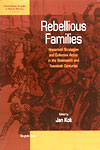Rebellious Families

Oxford/New York, Berghahn Books, 2002; ISBN 1-57181-529-5, 248 pp.
The question why people rebel is one of the most important questions historians and social scientists have been grappling with over the years. In most cases the research has focused on what people do if they rebel but hardly ever why they rebel.
The essays in this volume offer an alternative perspective, based on the question at what point families decided to add collective action to their repertoires of survival strategies. In this way this volume opens up a promising new field of historical research: the intersection of labour and family history.
The authors offer fascinating case studies in several countries spanning four continents during the last two centuries. In an extensive introduction the relevant literature on households and collective action is discussed, and the volume is rounded off by a conclusion that provides methodological and theoretical suggestions for further exploration of this new field in social history.
